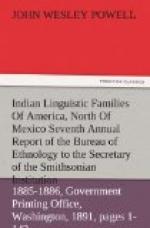A. Northern group: B. Pacific group: C. Southern group:
Ah-tena. [vA]ta[va]kut. Arivaipa. Kaiyuh-khotana. Chasta Costa. Chiricahua. Kcaltana. Chetco. Coyotero. K’naia-khotana. Dakube tedeFaraone. Gileno. Koyukukhotana. (on Applegate Creek). Jicarilla. Kutchin. Euchre Creek. Lipan. Montagnais. Hupa. Llanero. Montagnards. K[va]lts’erea tunn[ve]. Mescalero. Nagailer. Kenesti or Wailakki. Mimbreno. Slave. Kwalhioqua. Mogollon. Sluacus-tinneh. Kwa[t]ami. Na-isha. Taculli. Micikqwutme tunn[ve]. Navajo. Tahl-tan (1). Mikono tunn[ve]. PinalCoyotero. Unakhotana. Owilapsh. Tch[ve]kun. Qwinctunnetun. Tchishi. Saiaz. Taltuctun tude. (on Galice Creek). Tceme (Joshuas). Tc[ve]tl[ve]stcan tunn[ve]. Terwar. Tlatscanai. Tolowa. Tutu tunn[ve].
Population.—The present number of the Athapascan family is about 32,899, of whom about 8,595, constituting the Northern group, are in Alaska and British North America, according to Dall, Dawson, and the Canadian Indian-Report for 1888; about 895, comprising the Pacific group, are in Washington, Oregon, and California; and about 23,409, belonging to the Southern group, are in Arizona, New Mexico, Colorado, and Indian Territory. Besides these are the Lipan and some refugee Apache, who are in Mexico. These have not been included in the above enumeration, as there are no means of ascertaining their number.
Northern group.—This may be said to consist
of the following:
Ah-tena (1877)
364?
Ai-yan (1888)
250
Al-ta-tin (Sicannie) estimated (1888)
500
of whom there are at Fort
Halkett (1887) 73
of whom there are at Fort
Liard (1887) 78
Chippewyan, Yellow Knives, with a few
Slave and Dog Rib
at Fort Resolution
469
Dog Rib at Fort Norman
133
Dog Rib, Slave, and Yellow Knives at Fort
Rae 657
Hare at Fort Good Hope
364
Hare at Fort Norman
103
Kai-yuh-kho-tana (1877), Koyukukhotana
(1877),
and Unakhotana (1877)
2,000?
K’nai-a Khotana (1880)
250?
Kutchin and Bastard Loucheux at Fort Good
Hope 95
Kutchin at Peel River and La Pierre’s
House 337
Kutchin on the Yukon (six tribes)




